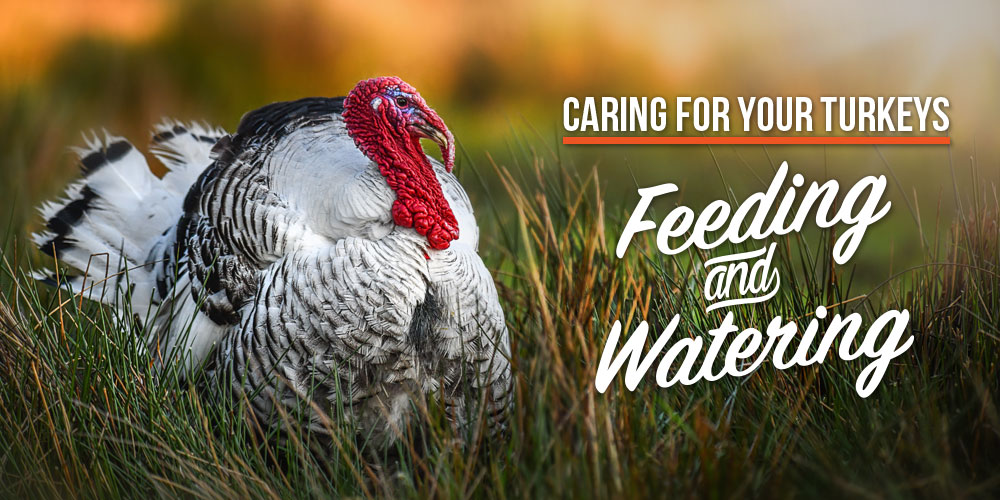
NAVIGATION
One of the first things I wanted to know when I started thinking about raising turkeys on my homestead was, what do turkeys eat? Feeding and watering turkeys properly not only keeps your birds healthy, but it can also save you money. As always, gaining some knowledge before you start is a good idea, and the tips I’ve learned have helped me waste less food, lose fewer young turkeys to chill and disease, and raise some healthy, full-flavored turkey meat.

Hi, I’m Ryan
Figuring out what my turkeys would need to eat and the best strategies for feeding and watering them from brooder to pen saved me time, money, and frustration in the long run. Getting my feeders, waterers, and feed system set up properly before I even brought my turkey poults home was key.

What You Need To Know About Feeding And Watering Turkeys

The first thing to know about feeding and watering turkeys is that when you bring them home, they’ll be completely dependent on you to teach them to eat and drink. Little poults are fragile creatures who don’t always instinctively search for food and water without a bit of prompting. This surprised me because I expected it to be intuitive, but feeding and watering turkeys becomes a very active process from the minute you get them home until they’re a couple of weeks old.
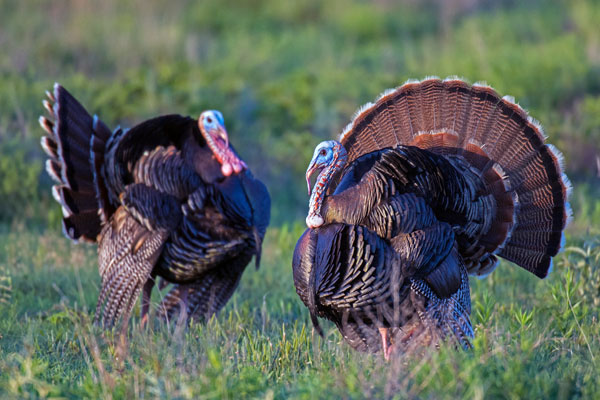 To help your new turkey poults start eating and drinking, you’ll likely need to lead them to the dishes and dip their beaks into the feed and water. Once they know where the food and water are, you’ll still want to keep an eye on them to ensure none are being bullied away from the dishes by other poults.
To help your new turkey poults start eating and drinking, you’ll likely need to lead them to the dishes and dip their beaks into the feed and water. Once they know where the food and water are, you’ll still want to keep an eye on them to ensure none are being bullied away from the dishes by other poults.
Another challenge in feeding baby turkeys is keeping them from pooping in their food and water dishes and keeping them dry. Getting wet can easily give them a chill, which can quickly lead to death in baby birds as fragile as turkeys. I prefer hanging feeders and waterers because it keeps the food and water at a level where it stays clean and the chicks stay dry. The good news is that after the first few weeks, your turkeys will be much lower maintenance, and your biggest hurdles in feeding them will be deciding what types of turkey feed to buy, how often to feed and water them, and how to keep from giving them food that isn’t good for them.
Types Of Turkey Feed

Before you bring your baby turkeys home, you’ll want to set up your feeders, waterers, bedding, and heat lamp in the brooder. You’ll start your birds off with a poultry starter feed before switching to a grower feed after about ten weeks. Turkey feed can come in pellet, mash, or crumble form, though I prefer pellets. I’ll explain what types of turkey feed I recommend and what some of my turkeys’ favorite foods are to snack on from my garden.
General Turkey Feed
Both poults and full-grown turkeys will need to have a poultry feed as their main diet, since they have high protein needs. When it comes to what type of feed, I generally prefer pellets because they’re the easiest to work with and you waste less feed. Whichever form you choose, I always recommend reading the ingredients list and choosing the most natural, organic feed possible for your budget.
Turkey Poult Feed
Young poults need more protein than grown turkeys, so for the first 10 weeks of your turkeys’ lives, they will need a medicated game bird, or poultry starter feed with 28% protein. If you need to use chicken starter, you can, but I don’t recommend it, as the protein percentage in chicken feed is lower than turkey feed. It’s best to bring new poults home when you know you’ll have the time to set up their brooder beforehand and closely monitor their feeding and watering habits for a week or two after their arrival.
Turkey Feed For Adult Turkeys
From around 10 weeks until about six months of age, you’ll want to give your birds a turkey grower feed that’s around 20% protein. If you’re harvesting your turkeys, they’ll be ready between 18 and 20 weeks, but if you’re keeping them as pets, for exhibition, or to lay eggs, you can switch your adult turkeys to lay pellets, crumbles or mash that has 16% to 18% protein.
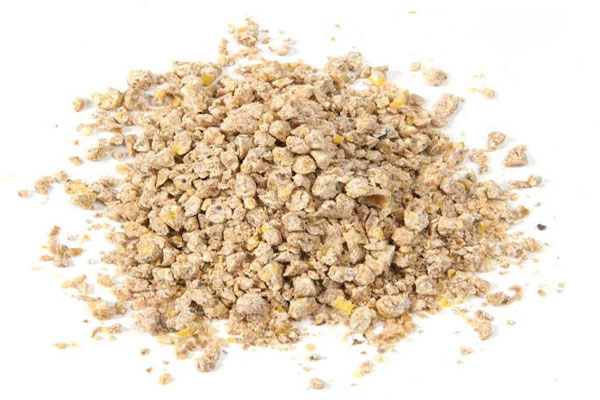 Once my turkeys are old enough to move outside (between 6 and 8 weeks, depending on when their feathers come in), I like to supplement their primary diet with some produce from my garden, which quickly became my turkeys’ favorite food. What whole foods does a turkey eat? Mine absolutely love fresh tomatoes, lettuce, and summer squash, and if you really want to give them a treat, they’ll gobble up sunflowers, ferns, and wild clovers like nothing else. Just remember that no matter how much your turkeys love the extra treats, they still require a high protein feed for most of their diet.
Once my turkeys are old enough to move outside (between 6 and 8 weeks, depending on when their feathers come in), I like to supplement their primary diet with some produce from my garden, which quickly became my turkeys’ favorite food. What whole foods does a turkey eat? Mine absolutely love fresh tomatoes, lettuce, and summer squash, and if you really want to give them a treat, they’ll gobble up sunflowers, ferns, and wild clovers like nothing else. Just remember that no matter how much your turkeys love the extra treats, they still require a high protein feed for most of their diet.
Grazing turkeys need the grit from fine gravel or coarse sand to properly digest the turkey feed and the grass they’ll be grazing. I like using sand on the bottom of the turkey coop for this reason.
Where To Buy Turkey Feed And What Kinds To Buy

You can buy turkey feed pretty easily online or at your local farm supply store. Make sure your starter feed is medicated with 28% protein and your grower feed has around 20% protein to help your turkeys grow strong, healthy, and tasty. I recommend purchasing an organic brand of turkey pellets, such as New Country Organics or Scratch & Peck Feeds.
What Can Turkeys Not Eat?

Aside from a lot of protein, turkeys also require high levels of vitamins A and D and some calcium to remain healthy. To make sure you’re meeting your turkey’s nutritional needs, I recommend avoiding feeds designed for other livestock (like chickens) or low-quality feeds made with a lot of processed ingredients. Other than feeds that won’t give them the best nutrition, there are also some specific foods you should avoid as they can be poisonous for turkeys.
What To Never Feed Your Turkeys
- Avocados
- Tomato and eggplant leaves
- Beans (raw or dried)
- Fruit pits and seeds
- Onions
- Processed foods
- Raw meat
- Anything dairy
- Chocolate or any other sweet
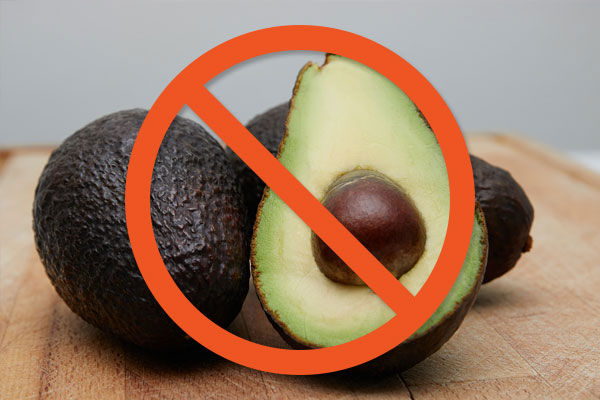
How Much Food Should Turkeys Have?

For freshly hatched chicks, I use a hanging feeder large enough to hold close to a 50-pound bag of 28% protein turkey feed, which means I don’t have to replenish it too often.
Making sure that they’re eating throughout the day is fine at this stage. By the time your poults grow into adult turkeys, they’ll get close to half of their nutrition from grazing grass and eating other wild and garden plants, but even adults will need a 20% grower feed to fill in the other half of their diet.
In the 18 to 20 weeks they take to grow to the correct weight for meat (if you’re planning on butchering), your turkeys will eat approximately 60 to 100 pounds of feed per bird.
How Much Food Does A Turkey Eat Per Day?
What your turkeys will eat in an average day depends on whether your turkeys are toms or hens, or if your flock is a mix of both. Adult toms can eat up to 2.5 cups of feed per day, while some hens eat as little as 2/3 of a cup in an average day. I have two toms and three hens in my flock, and I go through an average of 7 to 8 cups of feed daily.
What Is The Best Turkey Feeder?
The best turkey feeder is a hanging turkey feeder. I’m not particular on the brand, and the size will depend on how many poults you have, but when your baby turkeys are in the brooder, hanging a feeder at the height of your chick’s backs in the middle of the brooder (not too close to the heat lamp, but not too far away), will keep your feed clean, keep them from dumping it, and also allow them to be warm enough while they eat.
For adult outdoor turkeys, the best feeder will depend on how much room you have and how easy it would be to hang a feeder in your coop. I still like a hanging feeder in my turkey coop, but some homesteader friends opt for a standing feeder in theirs.
How High Should A Turkey Feeder Be?
I’ve found that a good rule of thumb for turkey feeders is keeping the feeder’s top lip at the same height as your turkeys’ backs. This height will keep your feeding turkeys from getting too much dirt or poop mixed into the feed and will also keep them from spilling it out onto the ground.
How Much Water Do Turkeys Need?

As a general rule, turkeys should drink about twice as much water as the amount of food they eat in a day.
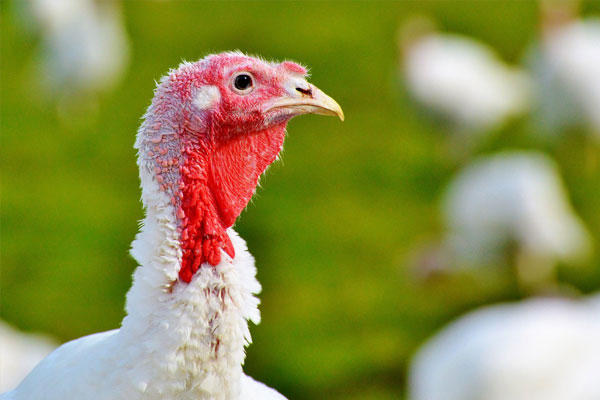 Once your turkeys are fully grown, you won’t have to worry as much about making them drink, but you’ll still want to make sure they’re all drinking daily. If your toms eat around 2.5 cups of water per bird in a day, then each of them should also drink close to 5 cups of water a day.
Once your turkeys are fully grown, you won’t have to worry as much about making them drink, but you’ll still want to make sure they’re all drinking daily. If your toms eat around 2.5 cups of water per bird in a day, then each of them should also drink close to 5 cups of water a day.
Hens won’t need quite as much, probably drinking closer to 1½ cups of water per day, though you might notice a spike if your hens are currently laying. You’ll be able to gauge how much the whole flock drinks by how fast they empty your turkey waterer.
How Often Do Turkeys Need Water?
I always recommend having one that holds a little more than your turkeys drink in case you aren’t able to refill their water as frequently as you’d like. Your turkey waterer, just like your feeder, should be level with your turkeys’ backs to help prevent spills and contamination.
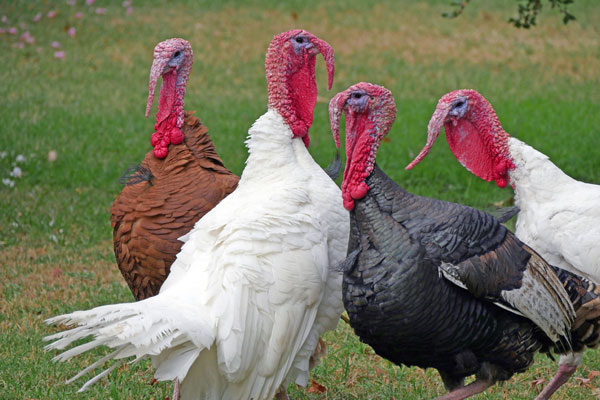
What Is The Best Waterer For Turkeys?
Like turkey feeders, I’m a fan of hanging turkey waterers, and for similar reasons. You’ll be cleaning your turkey’s bedding enough without worrying about water spilling from waterers. Keeping the water clean is also critical, as turkeys are prone to disease, and contamination from dirt and poop can make your birds sick. The best way to avoid contamination is to hang the waterer.
How Much Does It Cost To Feed A Turkey?

After you’ve calculated feed costs, however, you’ll want to factor in the price you pay for your chicks, the losses from any poults that don’t make it, and the equipment and building expenses for your brooder, coop, etc.
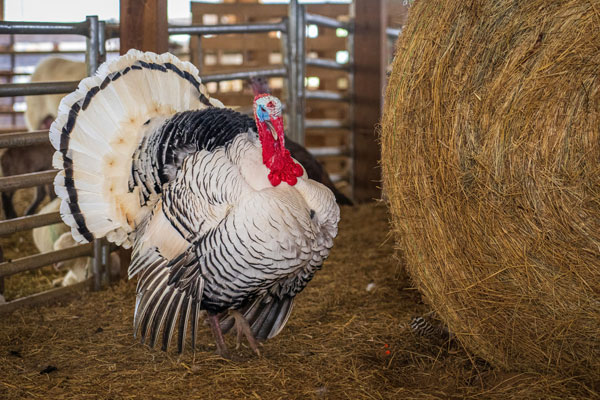
Your Turn!
- What turkey feeding tips have you discovered to keep your flock healthy?
- What issues have you had getting your baby turkeys to eat?




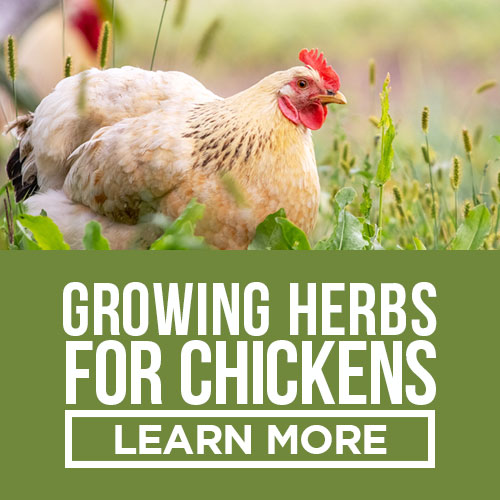



Nah. I cannot, in good conscience, create a trust relationship with captive creatures dependent upon me for their food and then betray that trust by killing them. I don’t like hunting either, but at least it’s more honest.